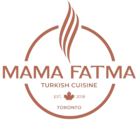Food is perhaps the most universal language we share. It requires no translation, crosses every border, and speaks directly to memory and comfort. And among the world’s great traditions, Turkish cuisine stands out as the ultimate cultural meeting point. Situated at the crossroads of Europe and Asia, and with a history that spans empires and trade routes, Turkish food naturally weaves together the flavors, ingredients, and customs of the Mediterranean, the Balkans, the Middle East, and Central Asia.
At Mama Fatma, we experience this connection every day. Our Mississauga restaurant, serving the incredibly diverse community of Toronto, Ontario, Canada, is a place where people from dozens of different backgrounds gather around the same table, often recognizing a piece of their own heritage in our dishes. We’re not just serving food; we’re celebrating the shared history that makes our cuisine so rich and welcoming.
Blog Contents
ToggleIngredients Shared Across Mediterranean Kitchens
The first reason Turkish cuisine feels so familiar to so many people is its reliance on a common pantry of core ingredients shared across the entire Mediterranean basin. From Italy and Greece to Lebanon and North Africa, the foundations of the diet are rooted in the same bounty of the sun and the sea.
The Universal Language of Yogurt and Olive Oil
Olive Oil: This is the golden thread running through all Mediterranean diets. In traditional turkish cuisine, olive oil is used not just for cooking but as a finishing element, lending its rich, fruity flavor to cold vegetable dishes (zeytinyağlılar) and fresh salads. This instantly resonates with anyone familiar with Greek or Italian cooking.
Yogurt (Yoğurt): Turkish yogurt is a global staple, so much so that its Turkish name is used worldwide. It is consumed plain, in savory dishes, and as a cooling beverage (Ayran). This use of fresh, thick, tangy yogurt provides an immediate point of connection for Balkan, Middle Eastern, and even Indian cuisines, which rely heavily on dairy for richness and balance.
Wheat and Pulses: The use of wheat (in bread, Pide, and pastries) and pulses (chickpeas, lentils, beans) is universal. Our Hummus and our creamy Lentil Soup are versions of dishes found from Jerusalem to Athens, reinforcing that we all draw from the same agricultural heritage.
When you taste our simple yet perfect grilled lamb and compare it to the grilled lamb of a Greek taverna, you realize the differences are nuanced, but the core flavor—the fresh herbs, the olive oil, and the lemon—is a shared language.
Taste the universality! Our meze platters are the perfect introduction to the shared, sun-drenched flavors that define turkish cuisine.
Spices That Bridge Flavor Traditions
While the ingredients provide the framework, the spices provide the cultural story, reflecting centuries of trade and empire. Traditional turkish cuisine uses spices masterfully—not to overpower, but to create aromatic depth, subtly linking the dish to its neighbors along the Silk Road.
Cumin and Coriander: These spices, while perhaps more famously associated with North African or Indian cuisine, are critical in Turkish meatballs (Köfte) and savory ground meat fillings. Their warm, earthy flavor is a reminder of the historical connections to Central Asia.
Sumac and Aleppo Pepper (Pul Biber): Sumac, with its beautiful, tart, crimson hue, provides a zesty tang to salads (like our Gavurdağı) that immediately connects us to Levantine and Persian kitchens. The vibrant red pepper flakes (Pul Biber) are essential for dishes like Adana Kebab, providing warmth and color without excessive heat, a distinct touch that bridges the spice profile between the Middle East and the Balkans.
Mint and Parsley: The generous use of fresh mint and flat-leaf parsley in our dips and salads is a defining feature shared with Lebanese and Greek salads, making our food instantly comforting to these communities.
The skillful blend of these spices means that a diner from Beirut recognizes the Sumac, while a diner from Thessaloniki recognizes the mint. The flavors are distinct, but the aromatic heritage is shared. We follow authentic turkish cuisine recipes that honor these ancient spice routes.
Explore the flavor journey! Try our Adana Kebab or our zesty Ezme and discover the complex, bridged flavors of the spice trade.
Meals Made To Be Shared—Regardless Of Background
The most profound way Turkish cuisine connects cultures is through its foundational belief in communal eating, embodied by the sofra (shared table). This tradition transcends ethnicity and simplifies social gatherings. Whether your family background is Italian, Filipino, or Palestinian, the sight of a table overflowing with small dishes immediately makes everyone feel welcome.
The Meze Table: The meze platter is the universal language of sharing. By offering a variety of small plates—creamy Hummus, smoky Baba Ghanoush, tangy Ezme—the meal becomes an interactive conversation. There is no awkwardness about ordering the “wrong” thing; everyone samples everything. This communal style of dining is instantly recognizable and comforting to anyone from a culture that values hospitality.
The Shared Main Course: Even main courses are designed for sharing. A massive Mixed Grill Platter, featuring Halal Kebabs and Turkish Food Doner, is meant to be attacked by many forks, rather than one individual plate. This abundance, or bereket, is the essence of Turkish hospitality—the idea that there is always more than enough for everyone.
This communal approach ensures that traditional turkish cuisine fosters connection, breaking down social barriers and making the dining experience an act of shared discovery.
Gather your community! Our generous sharing platters and turkish cuisine style make any gathering feel like a warm, traditional feast.
How Mama Fatma Connects Communities
Here in the wonderfully diverse environment of Toronto, Ontario, Mama Fatma serves as a literal meeting place for the world. Our menu is intentionally crafted to connect cultures and serve various community needs.
Halal Commitment: Our primary commitment to serving only halal meats is a crucial connector. It immediately opens our doors to Muslim communities from South Asia, the Middle East, North Africa, and Eastern Europe, ensuring they can enjoy delicious food without compromise.
Menu Diversity: We blend Turkish essentials with universal Mediterranean favorites. While Pide and Manti are Turkish staples, our inclusion of creamy hummus and zesty tabbouleh ensures that guests from the Levant feel equally at home. Our turkish cuisine recipes are authentic, but our presentation is globally welcoming.
The Sweet Finale: Even the desserts connect. Turkish cuisine desserts like Baklava are universally recognizable to anyone from the Balkans to Persia, making the final course a moment of shared sweetness. We are committed to being the best turkish cuisine near me by providing an authentic, inclusive experience.
Mama Fatma is more than just a restaurant; it’s a living celebration of the shared heritage that makes this part of the world so culinary rich.
Discover your next favorite dish! Mama Fatma is the cultural crossroads where authentic traditional turkish cuisine meets the diverse flavors of the world.
Visiting Mama Fatma Feels Like Home For Many
The ultimate test of a cuisine’s connective power is how it makes people feel. For many who visit Mama Fatma in Mississauga, our food instantly evokes a memory of home, even if that home isn’t geographically Turkey.
For Balkan Guests: The taste of well-made Manti (Turkish dumplings) or Sarma (stuffed leaves) immediately brings back memories of family kitchens in Greece, Bulgaria, or Macedonia. The flavor profiles are intrinsically linked.
For Arab Guests: The high quality of our grilled meats, the fresh herbs, and the perfectly crafted hummus feel authentically familiar, meeting the high standards of Middle Eastern hospitality.
For All Canadians: For those new to Turkish cuisine, the experience is welcoming because the flavors are grounded in familiar tastes—fresh vegetables, excellent grilled meat, and simple seasoning. It’s an accessible and instantly comforting cuisine.
Every dish, from the savory platters to the sweet turkish cuisine desserts, is prepared with the utmost care, honoring the history and the culture from which it comes. This is why Mama Fatma doesn’t just attract the Turkish community; it attracts the entire community looking for a truly authentic, shared, and welcoming dining experience.





